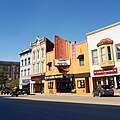Portal:Kansas
The Kansas Portal Kansas (/ˈkænzəs/ KAN-zəss) is a landlocked state in the Midwestern region of the United States. It borders Nebraska to the north; Missouri to the east; Oklahoma to the south; and Colorado to the west. Kansas is named after the Kansas River, in turn named after the Kansa people. Its capital is Topeka, and its most populous city is Wichita, however the largest urban area is the bi-state Kansas City, MO–KS metropolitan area. For thousands of years, what is now Kansas was home to numerous and diverse Indigenous tribes. The first settlement of non-indigenous people in Kansas occurred in 1827 at Fort Leavenworth. The pace of settlement accelerated in the 1850s, in the midst of political wars over the slavery debate. When it was officially opened to settlement by the U.S. government in 1854 with the Kansas–Nebraska Act, conflict between abolitionist Free-Staters from New England and pro-slavery settlers from neighboring Missouri broke out over the question of whether Kansas would become a free state or a slave state, in a period known as Bleeding Kansas. On January 29, 1861, Kansas entered the Union as a free state, hence the unofficial nickname "The Free State". Passage of the Homestead Acts in 1862 brought a further influx of settlers, and the booming cattle trade of the 1870s attracted some of the Wild West's most iconic figures to western Kansas. As of 2015, Kansas was among the most productive agricultural states, producing high yields of wheat, corn, sorghum, and soybeans. In addition to its traditional strength in agriculture, Kansas possesses an extensive aerospace industry. Kansas, which has an area of 82,278 square miles (213,100 square kilometers) is the 15th-largest state by area, the 36th most-populous of the 50 states, with a population of 2,940,865 according to the 2020 census, and the 10th least densely populated. Residents of Kansas are called Kansans. Mount Sunflower is Kansas's highest point at 4,039 feet (1,231 meters). (Full article...) This is a Good article, an article that meets a core set of high editorial standards.
 Fort Scott National Historic Site is a historical area under the control of the United States National Park Service in Bourbon County, Kansas, United States. Named after General Winfield Scott, who achieved renown during the Mexican–American War, during the middle of the 19th century the fort served as a military base for US Army action in what was the edge of settlement in 1850. For the next quarter century, it was used as a supply base and to provide security in turbulent areas during the opening of the West to settlement, a period which included Bleeding Kansas and the American Civil War. The current national historic site protects 20 historic structures, a parade ground, and five acres (20,000 m2) of restored tallgrass prairie, inside the city of Fort Scott. It is open to visitors most days of the year. (Full article...)Selected image - Credit: Kevin Zollman
Riley County Courthouse in Manhattan, Kansas. Important dates in Kansas' history
State facts
State symbols:
Selected article -Brown v. Board of Education of Topeka, 347 U.S. 483 (1954), was a landmark decision of the U.S. Supreme Court ruling that U.S. state laws establishing racial segregation in public schools are unconstitutional, even if the segregated schools are otherwise equal in quality. The decision partially overruled the Court's 1896 decision, Plessy v. Ferguson, which held that racial segregation laws did not violate the U.S. Constitution as long as the facilities for each race were equal in quality, a doctrine that had come to be known as "separate but equal." The Court's unanimous decision in Brown and its related cases paved the way for integration, was a major victory of the civil rights movement, and a model for many future impact litigation cases. The case originated in 1951 when the public school system in Topeka, Kansas, refused to enroll local black resident Oliver Brown's daughter at the school closest to their home, instead requiring her to ride a bus to a segregated black school farther away. The Browns and twelve other local black families in similar situations filed a class-action lawsuit in U.S. federal court against the Topeka Board of Education, alleging that its segregation policy was unconstitutional. A special three-judge court of the U.S. District Court for the District of Kansas heard the case and ruled against the Browns, relying on the precedent of Plessy and its "separate but equal" doctrine. The Browns, represented by NAACP chief counsel Thurgood Marshall, then appealed the ruling directly to the Supreme Court. (Full article...)General imagesThe following are images from various Kansas-related articles on Wikipedia.
CategoriesWikiprojectsRelated portalsKansas topicsNew articlesThis list was generated from these rules. Questions and feedback are always welcome! The search is being run daily with the most recent ~14 days of results. Note: Some articles may not be relevant to this project.
Rules | Match log | Results page (for watching) | Last updated: 2024-06-02 20:52 (UTC) Note: The list display can now be customized by each user. See List display personalization for details.
Things you can do
Associated WikimediaThe following Wikimedia Foundation sister projects provide more on this subject:
Discover Wikipedia using portals |


























































